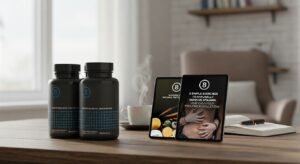Declining testosterone represents a growing health concern for aging men. Lower testosterone often causes unwelcome symptoms like low energy, diminished muscle mass and strength, cognitive issues, and reduced libido. With low testosterone prevalence increasing, many aging men seek natural solutions to support healthy testosterone levels safely. Could stinging nettle offer a science-backed solution? This article provides an evidence-based analysis of stinging nettle and its effects on testosterone in men.
What is Stinging Nettle?
Stinging nettle (Urtica dioica) is a medicinal herb with a long history of traditional use for treating inflammatory disorders and prostate health. Today, nettle root supplements are also commonly marketed to men as a natural testosterone booster.
The proposed mechanism involves nettle root’s compounds called lignans. Lignans in nettle may bind to sex hormone binding globulin (SHBG). SHBG binds to testosterone in the blood, rendering testosterone biologically unavailable. By binding SHBG, nettle lignans could allow greater free testosterone circulation. But does science support this theory or male health claims around stinging nettle? Let’s analyze the research.
Analyzing the Research on Nettles
Contrary to widespread claims about nettle and testosterone, current evidence remains mostly preliminary:
One promising pilot study in 2014 gave nettle root extract to 30 men ages 45-65. After 8 weeks supplementation with 1200 mg per day, bioavailable testosterone increased an average of 19.4% and luteinizing hormone also rose significantly. Luteinizing hormone stimulates testosterone production. However, free and total testosterone didn’t increase significantly.
Another trial combined nettle root with other herbs like eurycoma longifolia and epimedium. Rugby players took this formula for 5 weeks. The study found significant improvements in muscle mass, strength, sexual function, and both free and total testosterone levels versus placebo. However, the multi-herbal combination makes determining nettle’s solo contribution impossible.
Conversely, other studies found no advantages for this herb. A 2020 double-blind trial gave men with enlarged prostates (benign prostatic hyperplasia) a high 1000 mg daily dose of nettle root extract for 12 weeks. No changes occurred in testosterone levels or lower urinary tract symptoms versus placebo.
In summary, while early findings provide some cause for optimism, evidence proving stinging nettle supplements can increase testosterone or benefit vitality in aging men remains mostly speculative thus far. Well-designed placebo controlled trials clearly demonstrating efficacy as a testosterone booster are still lacking.
Possible Benefits for Prostate Health
Though unproven for boosting testosterone itself based on current research, stinging nettle shows promise for supporting prostate health – an important aspect of male vitality especially over age 40.
Multiple studies indicate stinging nettle can potentially ease urinary symptoms linked to enlarged prostates. As men age, prostate growth can impair urinary flow strength and frequency. Nettle root is thought to contain plant sterols that inhibit hormones driving prostate enlargement. This 2018 meta-analysis compiled data from seven clinical trials using stinging nettle extract for benign prostate hyperplasia. It concluded nettle may moderately improve urinary tract symptoms.
So while nettle is unlikely a testosterone “booster” itself based on current data, it does appear an effective traditional therapy for optimizing prostate health and urinary flow as men age – secondary benefits related to vitality.
Takeaway on Stinging Nettle
Based on current evidence:
✅ Stinging nettle likely supports prostate health and ease age-related urinary symptoms
❌ Claims about directly increasing testosterone lack sufficient clinical proof
While stinging nettle serves as an ancient, natural remedy for prostate support, more data is still needed before touting nettle as an evidence-based “testosterone booster” specifically. Managing consumer expectations seems warranted regarding any claims about dramatic testosterone enhancing effects with this herb.
However, stinging nettle does appear a safe and moderately effective plant therapy for optimizing prostate health and masculine vitality as men reach middle age and beyond.


